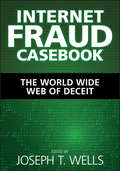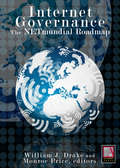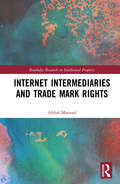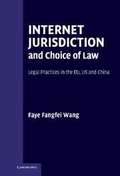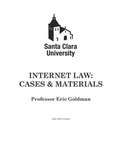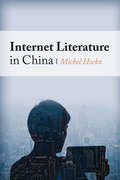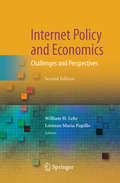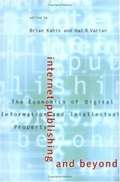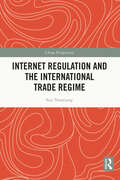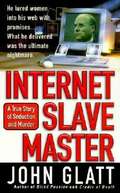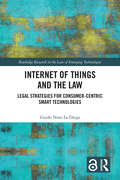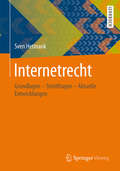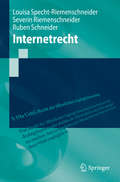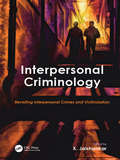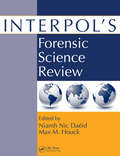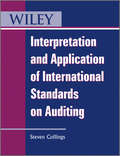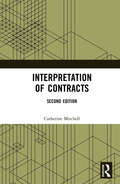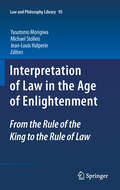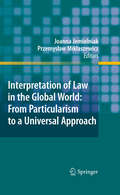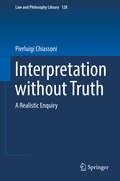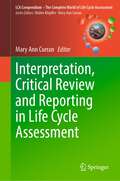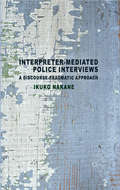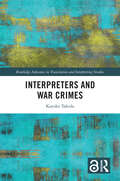- Table View
- List View
Internet Fraud Casebook
by Wells Joseph T.Real case studies on Internet fraud written by real fraud examiners Internet Fraud Casebook: The World Wide Web of Deceit is a one-of-a-kind collection of actual cases written by the fraud examiners who investigated them. These stories were hand-selected from hundreds of submissions and together form a comprehensive, enlightening and entertaining picture of the many types of Internet fraud in varied industries throughout the world. Each case outlines how the fraud was engineered, how it was investigated, and how perpetrators were brought to justice Topics included are phishing, on-line auction fraud, security breaches, counterfeiting, and others Other titles by Wells: Fraud Casebook, Principles of Fraud Examination, and Computer Fraud Casebook This book reveals the dangers of Internet fraud and the measures that can be taken to prevent it from happening in the first place.
Internet Governance: The NETmundial Roadmap
by Monroe E. Price Patrick Ryan Larry Gross Arlene Luck Joana Varon Ferraz Matthew Shears Ronaldo Lemos Vint Cerf Emma Llansó William J. Drake Max Senges Shawn Powers Jeremy Malcolm Lea Kaspar Nnenna Nwakanma Anriette Esterhuysen Avri Doria Samantha Dickinson Wolfgang Kleinwächter Richard Whitt Markus Kummer James Losey Marilia Maciel"Following up on the promise of the NETMundial meeting, this timely and useful book explores the challenges of implementing its roadmap for the future of Internet governance." -- Milton L. Mueller, Professor, Syracuse University School of Information Studies, USAInternet Governance: The NETmundial Roadmap explores key implications of the Global Meeting on the Future of Internet Governance held on April 23-24, 2014 in São Paulo, Brazil. At the meeting, government, business, civil society, Internet technical community and academic participants from around the world agreed to a "NETmundial Multistakeholder Statement" that included a "Roadmap for the Future Evolution of Internet Governance." This volume brings together leading practitioners and scholars to explore the challenges of implementing the Roadmap's section on institutional improvements, and was prepared for release and debate at September 2014 global Internet Governance Forum in Istanbul. The 16 chapters are grouped into six sections: Overviews; Strengthening the Internet Governance Forum; Filling the Gaps; Improving ICANN; Broader Analytical Perspectives; and Moving Forward. The book was produced as a part of the Internet Policy Observatory, a program at the Center for Global Communication Studies, the Annenberg School for Communication at the University of Pennsylvania. It is edited by William J. Drake of the University of Zurich and Monroe Price of the Annenberg School for Communication.
Internet Intermediaries and Trade Mark Rights (Routledge Research in Intellectual Property)
by Althaf MarsoofDespite the apparent advantages of the internet, there is little debate that it facilitates intellectual property infringements, including infringements of trade mark rights. Infringers not only remain hidden by the anonymity the internet provides but also take advantage of its increasing reach and the associated challenges with regard to cross-border enforcement of rights. These factors, among others, have rendered the internet a growing source of counterfeit and other infringing products. It has, therefore, become necessary for right holders to shift their focus from individual infringers to internet intermediaries, such as Internet Service Providers (ISPs), hosts and navigation providers, which are responsible in numerous ways for making content promoting infringements available to internet users. In light of these developments, this book conducts a comprehensive analysis of the liability of such intermediaries for trade mark infringements and considers the associated issues and challenges in the diverging approaches under which liability may be imposed. At present, however, neither UK trade mark law nor English common-law principles relating to accessorial liability provide a basis to hold internet intermediaries liable for trade mark infringements. As such, this book considers approaches adopted in some of the Continental European countries and the US in order to propose reforms aimed at addressing gaps in the existing legal framework. This book also examines alternative remedies, such as notice and takedown and injunctions, and discusses the associated shortcomings of each of these remedies.
Internet Jurisdiction and Choice of Law:
by Faye Fangfei WangThe adoption of electronic commercial transactions has facilitated cross-border trade and business, but the complexity of determining the place of business and other connecting factors in cyberspace has challenged existing private international law. This comparison of the rules of internet jurisdiction and choice of law as well as online dispute resolution (ODR) covers both B2B and B2C contracts in the EU, USA and China. It highlights the achievement of the Rome I Regulation in the EU, evaluates the merits of the Hague Convention on Choice of Court Agreement at the international level and gives an insight into the current developments in CIDIP. The in-depth research allows for solutions to be proposed relating to the problems of the legal uncertainty of internet conflict of law and the validity and enforceability of ODR agreements and decisions.
Internet Law: Cases & Materials
by Eric GoldmanThis is a casebook for students learning Internet Law, but other people interested in Internet Law may find it interesting. The book covers jurisdiction, contracts, trespass to chattels, intellectual property (copyright, trademarks and domain names), pornography, defamation and other information torts (including limits on web host liability), privacy, spam and the legal issues applicable to blogs and social media.
Internet Literature in China
by Michel HockxRanging from the self-consciously avant-garde to the pornographic, web-based writing has introduced innovative forms, themes, and practices into Chinese literature and its aesthetic traditions.
Internet Literature in China (Global Chinese Culture)
by Michel HockxSince the 1990s, Chinese literary enthusiasts have explored new spaces for creative expression online, giving rise to a modern genre that has transformed Chinese culture and society. Ranging from the self-consciously avant-garde to the pornographic, web-based writing has introduced innovative forms, themes, and practices into Chinese literature and its aesthetic traditions. Conducting the first comprehensive survey in English of this phenomenon, Michel Hockx describes in detail the types of Chinese literature taking shape right now online and their novel aesthetic, political, and ideological challenges. Offering a unique portal into postsocialist Chinese culture, he presents a complex portrait of internet culture and control in China that avoids one-dimensional representations of oppression. The Chinese government still strictly regulates the publishing world, yet it is growing increasingly tolerant of internet literature and its publishing practices while still drawing a clear yet ever-shifting ideological bottom line. Hockx interviews online authors, publishers, and censors, capturing the convergence of mass media, creativity, censorship, and free speech that is upending traditional hierarchies and conventions within China—and across Asia.
Internet Policy and Economics
by William H. Lehr Lorenzo Maria PupilloFor over a decade, William Lehr, Lorenzo Pupillo, and their colleagues in academia, industry, and policy have been on the electronic frontier, exploring the implications of the technologies that are revolutionizing communication and culture. In 2002, Cyber Policy and Economics in an Internet Age featured essays that focused on such emerging economic and policy-related issues of universal access, appropriate content, spectrum allocation, taxation, consumer protection, and regulation, with respect to the Internet. In this fully revised and updated edition, entitled Internet Policy and Economics: Challenges and Perspectives, the editors and contributors tackle the most current topics and issues, as the Internet continues to permeate all facets of society. New chapters cover dynamics in the developing world, the implications of e-commerce for fiscal policy, and the impact of peer-to-peer networks on music and the arts, as well as debates over intellectual property rights, privacy issues, and cybercrime. Applying insights from economics, political science, law, business, and communications, the book will serve as essential resource for researchers and students, policymakers and regulators, and industry analysts and practitioners.
Internet Privacy Rights
by Paul BernalInternet Privacy Rights analyses the current threats to our online autonomy and privacy and proposes a new model for the gathering, retention and use of personal data. Key to the model is the development of specific privacy rights: a right to roam the internet with privacy, a right to monitor the monitors, a right to delete personal data and a right to create, assert and protect an online identity. These rights could help in the formulation of more effective and appropriate legislation, and shape more privacy-friendly business models. The conclusion examines how the internet might look with these rights in place and whether such an internet could be sustainable from both a governmental and a business perspective.
Internet Publishing and Beyond: The Economics of Digital Information and Intellectual Property
by Brian Kahin Hal R. VarianThe rapid growth of the Internet and the World Wide Web is transforming the way information is accessed and used. New models for distributing, sharing, linking, and marketing information are appearing. This volume examines emerging economic and business models for global publishing and information access, as well as the attendant transformation of international information markets, institutions, and businesses. It provides those in the public, private, and nonprofit sectors with a practical framework for dealing with the new information markets. Topics addressed include the effects of various technological factors and market environments on pricing; the relationship among classic production costs, transaction costs, and the economic value of intellectual property; the effects of different pricing practices for telecommunications and Internet services on the pricing of information; the bundling and unbundling of information services; changing cost structures and the allocation of rights among authors, publishers, and other intermediaries; the effects of markets for complementary products and services, including advertising, on the pricing and use of information; and policy implications of different pricing models. A Publication of the Harvard Information Infrastructure Project in Collaboration with the School of Information Management and Systems at the University of California at Berkeley.
Internet Regulation and the International Trade Regime (China Perspectives)
by Sun NanxiangIn the age of information, an open Internet is a key component for modern economic development. This book analyses the World Trade Organization Agreement for virtual society and explores key questions regarding internet regulation and trade barriers. Information and communication technology has introduced a transformational element to international trade, in the shape of E-commerce. Although internet technology is conceptually neutral, it can be used as a medium that poses severe threats to individual rights, public morals, public order, and national security. World Trade Organization law and jurisprudence, which are the basis of global economic and trade rules, can be applied in the cyberspace but internet regulatory measures can also pose a threat to free trade. This book thus explores the following questions: whether internet regulation constitutes a trade barrier; if so, what form does that take; and whether WTO members can invoke exception clauses to justify their internet regulatory measures? The research provides deep interpretations on treaty law, case law, and draws on additional interdisciplinary approaches to answer these questions. This book will be of great interest to students and scholars of law, with a focus on International trade and internet regulation, as well as anyone interested in China’s Cyber law.
Internet Slave Master: A True Story of Seduction and Murder
by John GlattJohn Edward Robinson was a 56-year-old grandfather from rural Kansas. An entrepreneur and Eagle Scout, he was even honored as 'Man of the Year" at a Kansas City charity. To some of the women he met on the Internet, he was known as Slavemaster--a sexual deviate with a taste for sadomasochistic rituals of extreme domination and torture. <p><p> Masquerading as a philanthropist, he promised women money and adventure. For fifteen years, he trawled the Web, snaring unsuspecting women. They were never seen again. But in the summer of 2000, the decomposed remains of two women were discovered in barrels on Robinson's farm, and three other bodies were found in storage units. Yet the depths of Robinson's bloodlust didn't end there. For authorities, the unspeakable criminal trail of Slavemaster was just beginning... Internet Slave Master is a true story of sadistic murder in the Heartland, told by true crime master John Glatt.
Internet of Things and the Law: Legal Strategies for Consumer-Centric Smart Technologies (Routledge Research in the Law of Emerging Technologies)
by Guido Noto La DiegaInternet of Things and the Law: Legal Strategies for Consumer-Centric Smart Technologies is the most comprehensive and up-to-date analysis of the legal issues in the Internet of Things (IoT). For decades, the decreasing importance of tangible wealth and power – and the increasing significance of their disembodied counterparts – has been the subject of much legal research. For some time now, legal scholars have grappled with how laws drafted for tangible property and predigital ‘offline’ technologies can cope with dematerialisation, digitalisation, and the internet. As dematerialisation continues, this book aims to illuminate the opposite movement: rematerialisation, namely, the return of data, knowledge, and power within a physical ‘smart’ world. This development frames the book’s central question: can the law steer rematerialisation in a human-centric and socially just direction? To answer it, the book focuses on the IoT, the sociotechnological phenomenon that is primarily responsible for this shift. After a thorough analysis of how existing laws can be interpreted to empower IoT end users, Noto La Diega leaves us with the fundamental question of what happens when the law fails us and concludes with a call for collective resistance against ‘smart’ capitalism.
Internetrecht
by Sven HetmankDas Internet ist mit seiner nahezu unüberblickbaren Fülle an Informationen und Möglichkeiten das zentrale Medium der globalen Informationsgesellschaft geworden. Indem die Neuerungen der modernen Kommunikationstechnik, wie etwa Digitalisierung und weltweite Vernetzung in allen Lebensbereichen zu tiefgreifenden Veränderungen führen, wird auch das Recht in seiner Funktion als Ordnungsrahmen und Steuerungsinstrument mit völlig neuen Problemen konfrontiert. In dem Buch werden die vielfältigen und bisweilen auch komplexen Zusammenhänge des Internetrechts anschaulich, aber auch umfassend dargestellt. Neben der Darstellung der bei der Nutzung des Internets auftretenden spezifischen Rechtsfragen bietet das Werk Hinweise und Beispiele zu wichtigen Streitfragen und aktuellen Entwicklungen. Schwerpunkte sind insbesondere internetspezifische Rechtsfragen des Vertragsrechts sowie des Marken-, Urheber-, Datenschutz-, Wettbewerbs- und Haftungsrechts.
Internetrecht (Springer-Lehrbuch)
by Louisa Specht-Riemenschneider Severin Riemenschneider Ruben SchneiderDas Buch richtet sich spezifisch an Studierende mit entsprechendem Schwerpunktbereich, eignet sich aber auch als Einführung ins Internetrecht. Es bietet einen Überblick über die privatrechtlichen Rechtsfragen, die bei der Nutzung des Internets auftreten können und vertieft vor allem wichtige Aspekte des Urheberrechts, des Äußerungsrechts, des E-Commerce Rechts und des Domainrechts. Zahlreiche Klausurhinweise und Übungsfälle runden die Darstellung ab.
Interpersonal Criminology: Revisiting Interpersonal Crimes and Victimization
by K. JaishankarBased on peer-reviewed articles from the Second International Conference of the South Asian Society of Criminology and Victimology, Interpersonal Criminology investigates the roots of crime and victimization, rather than dissecting criminal behavior after the fact. The book divides crime by type, covering crimes against women, crimes against children and youths, culture conflict and victimization of groups, and interpersonal cybercrimes. Perfect for criminal justice practitioners and advanced human rights, criminology, and victimology students, Interpersonal Criminology explores the complexities of crime and interpersonal events in both established and emerging fields of criminology, including those concerning women and minorities.
Interpol's Forensic Science Review
by Max M. Houck Niamh Nic DaéidEvery three years, worldwide forensics experts gather at the Interpol Forensic Science Symposium to exchange ideas and discuss scientific advances in the field of forensic science and criminal justice. Drawn from contributions made at the latest gathering in Lyon, France, Interpol's Forensic Science Review is a one-source reference providing a comp
Interpretation and Application of International Standards on Auditing
by Steven CollingsWritten by Steven Collings, winner of Accounting Technician of the Year at the British Accountancy Awards 2011, this book deals with the significant changes auditing has undergone in recent years, due in large part to well-publicised corporate disasters such as Enron and Parmalat, which have shaken the profession. In response, many countries have replaced pre-existing domestic standards with International Standards on Auditing (ISAs) in an attempt to ensure that auditors throughout the world apply the same level of standards during all audit assignments, and that audit quality remains consistent on a global basis.International Standards on Auditing are frequently updated to improve and clarify their application throughout the audit and accounting profession. They can be extremely complex and difficult to apply in real life situations. It is essential to apply the standards with sufficient rigor to enable an efficient audit to take place, to satisfy the regulators and ensure that the client receives and audit which is beneficial, cost effective, and which conforms to the prescribed framework; however, auditors are often criticised for failing to do so.Recognising that auditing is not always an exact science, and that in many cases the auditor is called upon to make a judgement in situations open to differing opinions, this book takes a practical and pragmatic approach to following International Standards on Auditing. Steve Collings looks at the full ISAs in their final form, as reissued following the IAASB 'Clarity Project', and give auditors guidance on how to interpret and apply them in real life situations. Each redrafted or rewritten ISA is dealt with in a separate chapter, containing case studies and illustrative examples. The book also covers the regulatory framework of auditing and gives a summary of the five ethical standards applicable to auditors, as mapped by the IAASB. Detailed appendices provide an overview of IFRS and IAS, illustrative audit tests and illustrative financial statements.
Interpretation of Contracts: Current Controversies In Law
by Catherine MitchellThis book is a second edition of Interpretation of Contracts (2007). The original work examined various issues surrounding the question of how contracts should be interpreted by courts, in particular focusing on the law of contract interpretation following Lord Hoffmann’s exposition of the principles of contextual interpretation in Investors Compensation Scheme Ltd v West Bromwich Building Society [1998] 1 WLR 896. As with the original, this new edition provides an overview of the subject, concentrating on elements of controversy and disagreement, rather than a detailed analysis of all the contract law rules and doctrines that might be regarded as interpretative in one sense or another. The book will be concerned with interpretation of contracts generally (following the rule that there are not different rules of interpretation for different kinds of contracts), but with reference to commercial contracts in particular, since this is the area in which the contextual interpretative approach was developed, and where it has most relevance. The overall aim of the second edition remains the same as the first – to produce an accessible and readable guide to contract interpretation for law students, scholars and practitioners.
Interpretation of Law in the Age of Enlightenment
by Michael Stolleis Yasutomo Morigiwa Jean-Louis HalperinA collaboration of leading historians of European law and philosophers of law and politics identifying and explaining the practice of interpretation of law in the 18th century. The goal: establishing the actual practice in the Age of Enlightenment, and explaining why this was the case. The ideology of the Age was that law, i.e., the will of the sovereign, can be explicitly and appropriately stated, thus making interpretation redundant. However, the reality was that in the 18th century, there was no one leading source of national law that would be the object of interpretation. Instead, there was a plurality of sources of law: the Roman Law, local customary law, and the royal ordinance. However, in deciding a case in a court of law, the law must speak with one voice. Hence, interpretation to unify the norms was inevitable. What was the process? What role did justification in terms of reason, the hallmark of the Enlightenment, play? These are some of the questions addressed.
Interpretation of Law in the Global World: From Particularism to a Universal Approach
by Przemyslaw Miklaszewicz Joanna JemielniakThe volume examines the impact of applying transnational rules on the repertory, methods and practice of legal interpretation. It scrutinizes how globalization processes in law - those reaching top-down (such as European law), as well as those developing bottom-up (such as the new lex mercatoria and international commercial arbitration) - influence the often highly innovative use of various methods of legal rendition. It also examines to what extent they affect supranational and domestic decision-making. Capturing the current development of universalizing tendencies in legal interpretation, the book offers both an extensive theoretical background and thorough studies on adjudicatory practice in such fields as European and constitutional law, international business law and arbitration or criminal law.
Interpretation without Truth: A Realistic Enquiry (Law and Philosophy Library #128)
by Pierluigi ChiassoniThis book engages in an analytical and realistic enquiry into legal interpretation and a selection of related matters including legal gaps, judicial fictions, judicial precedent, legal defeasibility, and legislation. Chapter 1 provides an outline of the central theoretical and methodological tenets of analytical realism. Chapter 2 presents a conceptual apparatus concerning the phenomenon of legal interpretation, which it subsequently applies to investigate the truth-in-legal-interpretation issue. Chapters 3 to 6 argue for a theory of legal interpretation - pragmatic realism - by outlining a theory of interpretive games, revisiting the debate between literalism and contextualism in contemporary philosophy of language, and underscoring the many shortcomings of the container-retrieval view and pragmatic formalism. In turn, Chapter 7, focusing on comparative legal theory, advocates an interpretation-sensitive theory of legal gaps, as opposed to purely normativist ones. Chapter 8 explores the connection between judicial reasoning and judicial fictions, casting light on the structure and purpose of fictional reasoning. Chapter 9 provides an analytical enquiry into judicial precedent, examining a variety of ideal-typical systems in terms of their normative or de iure relevance. Chapter 10 addresses defeasibility and legal indeterminacy. In closing, Chapter 11 highlights the central tenets of a realistic theory of legislation.
Interpretation, Critical Review and Reporting in Life Cycle Assessment (LCA Compendium – The Complete World of Life Cycle Assessment)
by Mary Ann CurranThis book discusses the phase “Interpretation” in an outstanding way. According to the opinio communis within the LCA community, “Interpretation” is classified as fourth phase of the LCA framework. However, referring to ISO 14040, this book defines “Interpretation” according to its function in the LCA framework, and this means that “Interpretation has a much broader influence than generally accepted. It overarches goal and scope, inventory analysis and impact assessment. Conclusions are drawn from the results of the inventory and the impact assessment, and recommendations refer to the objective of the study, the goal and scope phase. Likewise to be considered are the defined framework conditions, the reasons for carrying out the study as well as the context of the intended applications and the target groups of the results). A second highlight of this book concerns “Interpretation” as discussed in conjunction with Critical Review and Reporting, which is an outstanding approach. The relationship between interpretation and critical review can be seen in the fact that interpretation is a kind of structured preparation of a critical review; in practice, the performance of a critical review can be made much easier if the preparers of a life cycle assessment study very carefully follow the requirements that are specifically placed on the interpretation. Because the critical review is the independent quality control of an LCA, the results improve the credibility of reporting. The critical review helps to avoid text weaknesses and potential misunderstandings because these aspects will easier be realized by independent readers from different viewpoints. The reviewers thus also represent the first readership of a study and can help to ensure that the specific requirements for good and clear reporting of life cycle assessments are met. Sound reporting needs clear conclusions.
Interpreter-mediated Police Interviews: A Discourse-Pragmatic Approach
by I. NakaneThis book shows how participation of interpreters as mediators changes the dynamics of police interviews, particularly with regard to power struggles and competing versions of events. The analysis of interaction offers insights into language in the legal process.
Interpreters and War Crimes (Routledge Advances in Translation and Interpreting Studies)
by Kayoko TakedaTaking an interdisciplinary approach, this book raises new questions and provides different perspectives on the roles, responsibilities, ethics and protection of interpreters in war while investigating the substance and agents of Japanese war crimes and legal aspects of interpreters’ taking part in war crimes. Informed by studies on interpreter ethics in conflict, historical studies of Japanese war crimes and legal discussion on individual liability in war crimes, Takeda provides a detailed description and analysis of the 39 interpreter defendants and interpreters as witnesses of war crimes at British military trials against the Japanese in the aftermath of the Pacific War, and tackles ethical and legal issues of various risks faced by interpreters in violent conflict. The book first discusses the backgrounds, recruitment and wartime activities of the accused interpreters at British military trials in addition to the charges they faced, the defence arguments and the verdicts they received at the trials, with attention to why so many of the accused were Taiwanese and foreign-born Japanese. Takeda provides a contextualized discussion, focusing on the Japanese military’s specific linguistic needs in its occupied areas in Southeast Asia and the attributes of interpreters who could meet such needs. In the theoretical examination of the issues that emerge, the focus is placed on interpreters’ proximity to danger, visibility and perceived authorship of speech, legal responsibility in war crimes and ethical issues in testifying as eyewitnesses of criminal acts in violent hostilities. Takeda critically examines prior literature on the roles of interpreters in conflict and ethical concerns such as interpreter neutrality and confidentiality, drawing on legal discussion of the ineffectiveness of the superior orders defence and modes of individual liability in war crimes. The book seeks to promote intersectoral discussion on how interpreters can be protected from exposure to manifestly unlawful acts such as torture.
